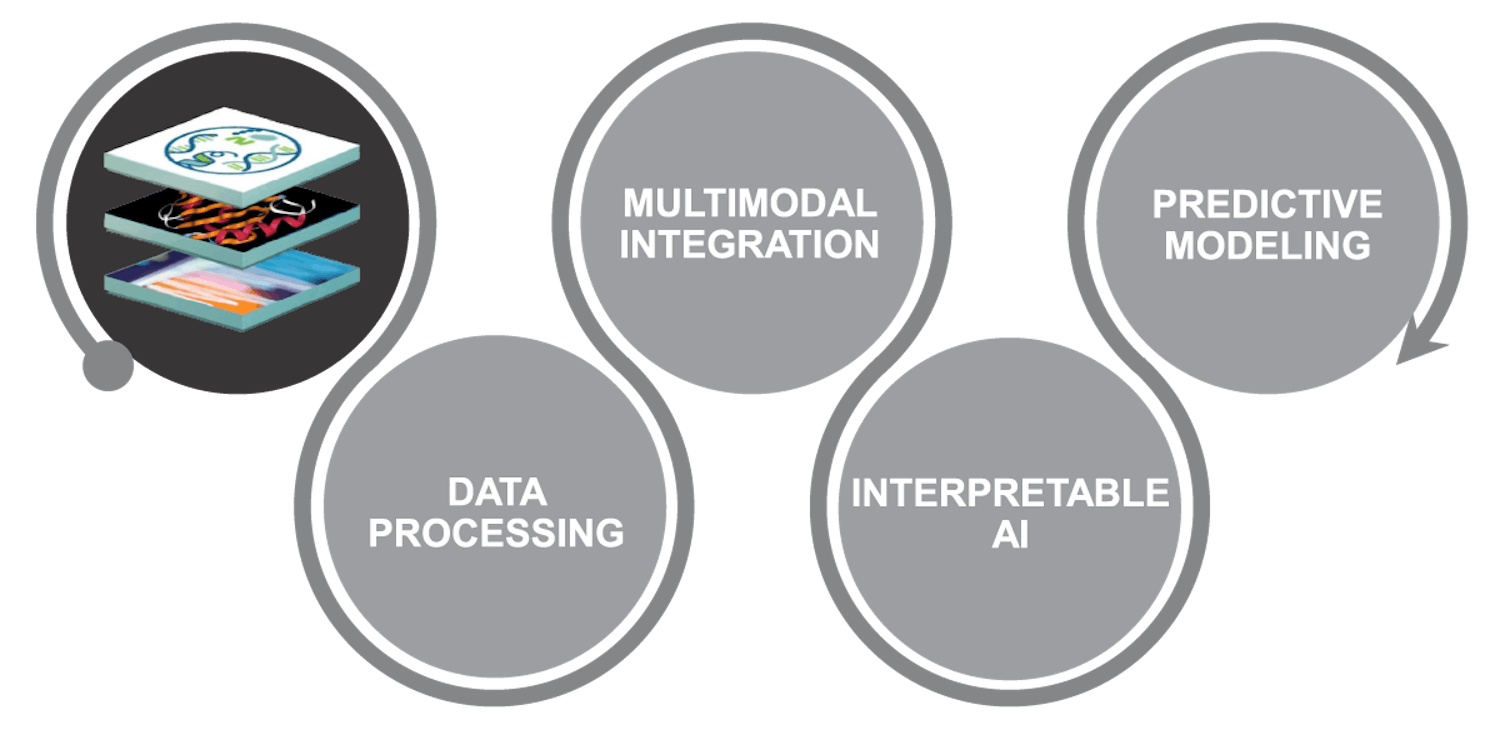Ready to push the boundaries of life sciences?
Join our experts and turn AI into real-world impact. From advanced biosensing to interpretable AI, we’re transforming drug discovery and personalized medicine. Let's accelerate innovation together.
Focus on multi-omics analysis and explainable, interpretable AI to drive the digital transformation of the biopharma sector, with the goal of accelerating drug discovery, novel curative therapies, diagnostics, and personalized healthcare.

The pharmaceutical industry is rapidly catching up with major companies investing heavily in AI technologies. This shift presents unprecedented opportunities to revolutionize drug development and patient care by making use of those AI tools.
Key components of the development of AI tools:

We integrate omics, imaging, and temporal data with machine learning to analyze diverse data types, enabling precision medicine through tailored biomarker discovery and predictive therapeutics. Our MultiOmix framework is designed to combine various types of data (genomics, transcriptomics, proteomics) for enhanced and personalized medicine applications.
MultiOmix represents a breakthrough in multimodal data integration, specifically designed to combine various types of omics data (genomics, transcriptomics, proteomics).
CSEM's multi-modal approach to single-cell analysis and organoids leverages cutting-edge technologies to deliver comprehensive cellular insights through AI-powered clustering based on visual and molecular similarities of cell-organoid images.
Our multi-modal analysis capabilities advance precision medicine by integrating data in order to understand disease mechanisms, identify biomarkers for complex conditions, and predict treatment responses.

We combine interpretable representation learning, explainable knowledge distillation, and post-hoc interpretability methods to build biologically informed models and ensure model transparency. CSEM's approach to explainable AI in life sciences delivers three core benefits:
This framework helps researchers and clinicians make better decisions and encourages teamwork between data scientists and experts. It combines methods such as biologically based learning and knowledge sharing from complex to simpler models. These methods are useful to discover biomarkers, develop drugs, personalize medicine, and support clinical decisions, ensuring AI is trustworthy and practical in real-world situations.

CSEM's MultiOmix framework demonstrates our expertise in the efficient processing of complex biological data types. We develop modular, cloud-ready architectures that scale with data volumes. Our automated platforms use deep learning to improve accuracy, especially in microtissue analysis and drug testing. This end-to-end approach enables reliable data processing—from collection to analysis— driving innovation in drug development and personalized medicine.
Our modular framework allows researchers to:
Biologically informed neural networks (BINNs) enhance the interpretability of deep learning models, helping to identify disease-relevant biomarkers and pathways. By integrating prior knowledge of biomarker-pathway relationships into sparse networks, BINNs perform well in various tasks. However, the robustness of these biomarker signatures is underexplored. We are proud to introduce DeepBINN, a new architecture that learns pathway importance during training, enhancing interpretability without post-hoc methods. In a preliminary study, DeepBINN effectively stratified patients with septic acute kidney injury, showing improved interpretability and robustness while maintaining top performance.
For further reading on advancements in Brain-on-Chip technology and their applications in brain disease research, you can refer to this detailed IEEE article: Innovative Brain-on-Chip Technology for Neurological Research. (Please note that access to this article requires a subscription or purchase)
An innovative deep learning model is being developed to bridge the translational gap between animal models and human applications in biomedical research. Traditionally, rodents are used to study disease mechanisms and test new drug candidates, but significant biological differences between rodents and humans often prevent direct application of these findings to human health. This AI-driven approach will enhance the transferability of research results from animals to humans, ensuring more accurate and applicable findings. The initial case study will focus on medulloblastoma, a rare and difficult-to-treat type of cerebellar cancer, marking a significant improvement in the efficacy of biomedical research and accelerating the development of novel therapies.
This project "AI-based transfer of research results from animals to humans" has been awarded a 2024 FreeNovation Grant by Novartis, recognizing its potential to transform translational medicine through the power of artificial intelligence.
Join our experts and turn AI into real-world impact. From advanced biosensing to interpretable AI, we’re transforming drug discovery and personalized medicine. Let's accelerate innovation together.
Explore some of our developments in AI for life sciences.
Artificial intelligence is transforming biotechnology, powering advances from multi-omics data analysis and image-based screening to fully automated laboratory workflows. At CSEM, we translate interpretable machine-learning methods into robust tools that accelerate drug discovery, enable precise clinical diagnostics, and support personalized medicine. The examples below showcase how we co-develop industry-ready AI solutions in close partnership with large companies, biotech start-ups, and hospitals.